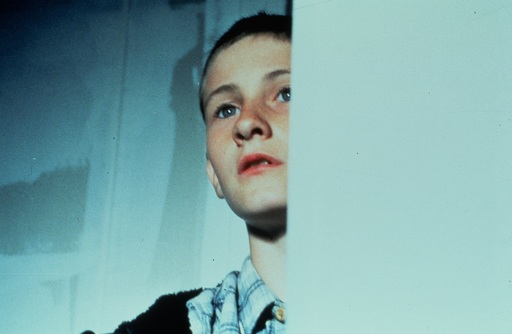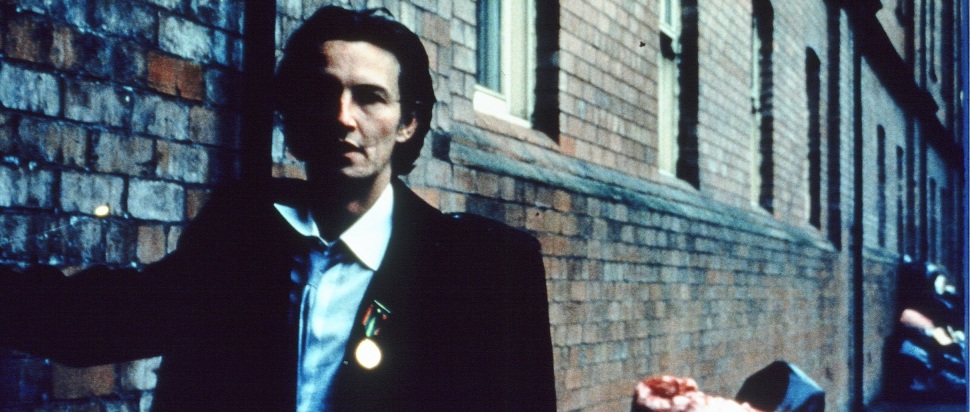Eye for Film: The greatness of Lynne Ramsay's early shorts
Ahead of the 25th-anniversary rerelease of Lynne Ramsay's Ratcatcher, one writer explores how Ramsay's talent for visual filmmaking was forged in her early shorts like Gasman and Small Deaths
Images repeat themselves throughout the first three short films by Scottish filmmaker Lynne Ramsay. Curtains flutter imperceptibly in the breeze; barren landscapes seem to stretch forever; faces flicker in artificially lit darkness. Ramsay distils the entire visual ethos of this early work in the opening shot of her debut feature Ratcatcher (1999), which sees a boy twirling through net curtains, the shot blurred and indistinct, dreamlike – and abruptly ended by the cold, harsh slap of adulthood.
This hard shock at the reality of becoming an adult is also present at the very beginning of Ramsay’s career – particularly in the shorts Small Deaths (1996) and Gasman (1997). Both centre on a girl named Lynne coming to terms with what lies beyond childhood.
Small Deaths is split into three snapshots, each with Lynne at a different age witnessing a betrayal of innocence, a 'small death’ of what it means to be a child. In a different filmmaker’s hands, these themes could be overly ambitious for an 11-minute short, but not in Ramsay’s. Her cinema is one of images. Dialogue is sparse, fraught with deeper meaning, skirting on top of what the characters really mean. We infer entire family dynamics in simple, lingering shots: Lynne riding her tricycle in the kitchen, around and around in monotony; her mother staring out the window as her father leaves for God-knows-where for God-knows-how-long; a close-up of Lynne’s face as she asks when her Da is coming home and needs no answer – she already knows, subliminally, fundamentally. All of this is evident in the face. No words or exposition are needed.
In the second part of Small Death's triptych, Lynne witnesses the death of a cow, killed by local boys. An entire lifetime of pain, regret, and innocence passes through Lynne’s and the cow’s eyes – a mutual understanding that life is not what you thought it would be, captured in two silent close-ups. Every detail in this short is imagined and managed so expertly that it’s incredible to think this is the first time Ramsay was behind a camera.

Ratcatcher
Gasman is similarly astonishing. We’re introduced to a family that is close to shattering. Something is amiss, and again this is expressed solely through image. Small flashes of discomfort and discontent are hinted at, telling us of an altogether more desolate reality. A boy pours sugar over a toy car as Let it Snow plays on the radio, but there's little cheer in this Christmas fable. We follow a father, his daughter (Lynne) and his son as they walk – at times together, at times apart – down a disused railway line. Somewhere along the line, they meet a boy and a girl who are their mirror image: kids who are eerily similar to them, albeit a bit shabbier, worn at the edges. The children don’t know what any of this means, perfectly encapsulating that foggy haziness of childish understanding. Ramsay leaves the audience in the dark too, but we can join the dots that are initially beyond the children.
All of these early technical and thematic nuances are built upon in Ratcatcher. Ramsay follows a legacy set out by Kes and sets one up for others to follow (Sean Baker’s The Florida Project comes to mind) in her debut. Set in 70s Glasgow, it is concerned with the life of James Gillespie, a 12-year-old boy living through the city’s bin strike. He’s surrounded by abject poverty, grime and cruelty, conveyed so effectively in the smallest of details – a scabby knee, a dead rat, the squelch of a bin bag. A less deft filmmaker might let this story be weighed down by its politics but Ratcatcher balances every note perfectly, summing up 70s Britain in the image of James’s sister, Anne-Marie, eating a sandwich, unperturbed, on a pile of rubbish, with boys behind her remarking on the smell.
This uncanny ability to encapsulate overwhelming ideas in a single image, a snatch of dialogue or a piece of sound continues throughout the film, particularly painfully in a scene near the midpoint where James’s mother is picking through his hair for lice. “Can I see?” he asks. His mother lowers the comb down and shows him the little black louse. His eyes, large and pained, focus on it. “Is that it?” he says eventually, laying his head down on the kitchen table, the camera lingering on his face in silence.
In Ratcatcher, this silence reigns. There are swathes of time where all we hear is James’s ragged breathing, or simply nothing at all. The score doesn’t make its first appearance until the film’s breathtaking midpoint, which sees James running through a golden field of wheat, blue sky beatific behind him, the grey nothingness of home left behind. It is a rare sliver of hope from Ramsay, a filmmaker who doesn’t shy away from the difficult and the ugly. But here, she lets the light of childhood in briefly, before gently closing the door.
Ratcatcher is rereleased in 4K from 12 Apr by Park Circus, with screenings taking place at Glasgow Film Theatre, the Cameo and the Scotsman Picturehouse in Edinburgh, and Dundee Contemporary Arts
Lynne Ramsay is also GFT's CineMaster this month. In addition to Ratcatcher, they're screening Morvern Callar on 6 & 11 Apr (35mm on 6th); We Need to Talk About Kevin on 20 & 24 Apr (both 35mm); and You Were Never Really Here on 27 & 30 Apr
